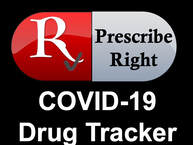|
Remdesivir
A case study described a mechanically ventilated 40-year-old patient with severe COVID-19 that was treated with delayed initiation of remdesivir. Because remedesivir was not readily available, the patient was initiated on hydroxychloroquine. After five days, hydroxychloroquine was discontinued due to an increase in ALT and AST. Remdesivir was obtained through a compassionate use program and started on day 13 (it took 9-days to obtain the drug supply). The patient improved and was extubated on the third day of remdesivir treatment. Hydroxychloroquine The Prevention and Early Treatment of Acute Lung Injury (PETAL) Clinical Trials Network of NIH is evaluating hydroxychloroquine compared to standard of care in a Phase III, ORCHID trial involving 500 adult, hospitalized patients with COVID-19. The study began in April 2020. Immunoglobulin Johns Hopkins, Stanford, Columbia, Mayo Clinic, Washington University and others have published a review of the evidence for the use of convalescent plasma to treat COVID-19 and step-by-step instructions for how to collect, process, store and administer transfusions. General Treatment Guidelines JAMA published a review of drugs to treat COVID-19. The review is current as of articles published March 25, 2020. The authors found that most evidence was from case studies and case series. They warn of confounding and selection bias along with shifting demographics of patients, testing, and treatment approaches. AHA, ACC and HRS published Considerations for Drug Interactions on QTc in Exploratory COVID-19 (Coronavirus Disease 19) Treatment to provide guidance on the arrythmia potential of hydroxychloroquine, chloroquine, azithromycin and lopinavir/ritonivir in the treatment of COVID-19. The review includes a table rating potential adverse cardiac events of the medications. COVID-19 Vaccines Sanofi and GlaxoSmithKline have agreed to work together to develop a vaccine for COVID-19. The companies will use Sanofi’s S-protein COVID-19 antigen based on the company’s recombinant DNA tech in combination with GSK’s pandemic adjuvant technology. The recombinant DNA platform is the same one used to create the quadrivalent influenza vaccine FluBlok. GSK’s vaccine adjuvant reduces the amount of antigen required for a dose enabling a quicker way to scale up production. Both companies have the capacity to manufacture vaccines on a global scale. The companies forecast clinical trials beginning in the second half of 2020 and a BLA filed in the second half of 2021. Comments are closed.
|
Stay informed, subscribe to the Prescribe Right Pharmaceutical Pipeline Tracker
Archives
January 2023
Categories |
Services |
Company |
Support |
© COPYRIGHT 2015. ALL RIGHTS RESERVED.
|


 RSS Feed
RSS Feed